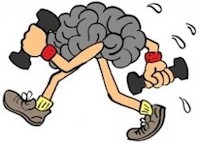 Yes, indeed, you can change your brain and memory for the better. Your brain is constantly adapting to what you are doing, new information, and new perspectives.
Yes, indeed, you can change your brain and memory for the better. Your brain is constantly adapting to what you are doing, new information, and new perspectives.
Isn't the ceiling of the Sistine Chapel amazing? When Michelangelo painted this incredible work of art, he worked in an awkward position, looking up, for months on end. Extraordinarily, his brain adapted so well to this changed perspective that it took many months for him to stop seeing the world in a strange upside down way. In a similar way brain scans of London taxi drivers have shown they have highly developed areas related to spatial memory, and musicians have larger areas in the motor cortex of the brain related to active hands.
Twenty years ago it was firmly believed that when we reached adulthood our brain was fully developed and that was that – we had only the brain neurons we were born with. What's more, by middle-age we would be shedding brain cells at a prodigious rate and it was all downhill from there! What a prospect.
New and sophisticated brain imaging techniques over the past decade have, thank goodness, dispelled these myths once and for all. Your brain is a flexible, developing, rewiring, adaptable organ that can grow and develop throughout your life. Your experiences, emotions, behaviours and your thoughts are constantly changing and reshaping your brain.
This process has enormous advantages for us. The more we look after our brain and memory, the better it will serve us. Your brain will adapt to the uses you put it to. If you learn a new skill such as a new language the interconnections between your brain neurons will adjust and grow to accommodate the new skill. Conversely, if we don't use skills we have acquired over our lifetime, the connections to it will gradually degrade and fade away. An example of this became very clear during research I carried out on what happens to our various types of memory during the ageing process. One of the memory tasks was face recognition. It soon became very apparent that as we grow older, especially if we have little contact with young people, that the ability to distinguish between them diminishes. If we are living and socialising primarily with other older folk, then the ability to recognise other older people stays as good as it ever was, but young people can begin to look alike. The brain sheds skills and information that we don't use. We definitely have 'use it or lose it' brains!
 This ability for the brain to change and adapt – termed neuroplasticity – is enormously important to us. We are responsible for exercising and growing our brain connections in just the same way that we are responsible for keeping physically fit, taking care with nutrition, and staying interested in other people and what is going on around us.
This ability for the brain to change and adapt – termed neuroplasticity – is enormously important to us. We are responsible for exercising and growing our brain connections in just the same way that we are responsible for keeping physically fit, taking care with nutrition, and staying interested in other people and what is going on around us.
So, what difference can we make to our neuroplasticity?
Neuroplasticity is the brain's astonishing ability to physically change and adapt to our behaviours, thoughts, emotions, and environment.
Change takes place in the brain from before we were born (when a brain grows by 250,000 neurons per minute!) until the day we die.
Change takes place when the brain is busy, focused, and we are interested in what we are doing.
Change and practice strengthens the connections between brain neurons that are engaged at the same time. There is truth in the saying that 'Neurons that fire together, wire together'. This means they make a strong, reliable neural pathway which makes remembering much easier.
 Neuroplasticity is a competitive process! If an area of the brain, or our knowledge, is inactive then that capacity will be taken over. Again, use it or lose it. If you do nothing, think about nothing, and have few interests then the brain will slow down and lose capacity. BUT, as you engage fully in life, keep alert and interested, exercise body and brain, and enjoy life as much as possible your brain will expand, grow in efficiency and your memory will grow in leaps and bounds.
Neuroplasticity is a competitive process! If an area of the brain, or our knowledge, is inactive then that capacity will be taken over. Again, use it or lose it. If you do nothing, think about nothing, and have few interests then the brain will slow down and lose capacity. BUT, as you engage fully in life, keep alert and interested, exercise body and brain, and enjoy life as much as possible your brain will expand, grow in efficiency and your memory will grow in leaps and bounds.
Dr. Allison Lamont is founder and clinician at the Auckland Memory Clinic. You can contact her at (09) 575 5432 or email her at dr.lamont(at)xtra.co.nz
Visit the Auckland Memory Clinic website and the Brain and Memory Foundation for interesting information about your memory and how to improve it.
Read more from Dr Allison Lamont here









Join the Discussion
Type out your comment here:
You must be logged in to post a comment.